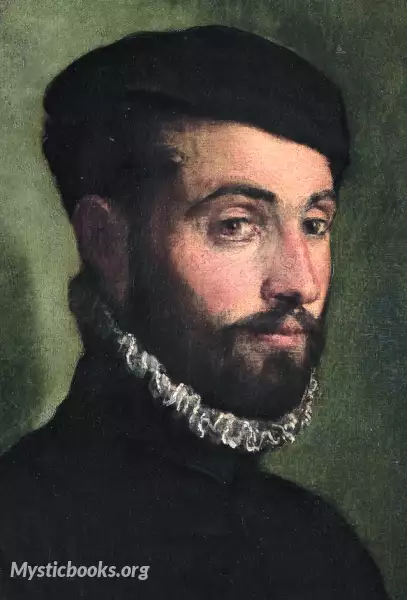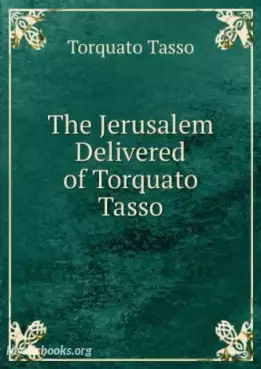
Timeline
Title
Country/Nationality
Torquato Tasso
Torquato Tasso was an Italian poet of the 16th century, known for his 1591 poem Gerusalemme liberata (Jerusalem Delivered), in which he depicts a highly imaginative version of the combats between Christians and Muslims at the end of the First Crusade, during the Siege of Jerusalem of 1099.
Tasso had mental illness and died a few days before he was to be crowned on the Capitoline Hill as the king of poets by Pope Clement VIII. His work was widely translated and adapted, and until the beginning of the 20th century, he remained one of the most widely read poets in Europe.
Born in Sorrento, Torquato was the son of Bernardo Tasso, a nobleman of Bergamo and an epic and lyric poet of considerable fame in his day, and his wife Porzia de Rossi, a noblewoman born in Naples of Tuscan origins. His father had for many years been secretary in the service of Ferrante Sanseverino, Prince of Salerno, and his mother was closely connected with the most illustrious Neapolitan families. When, during the boy's childhood, the prince of Salerno came into collision with the Spanish government of Naples, being subsequently outlawed and deprived of his hereditary fiefs, Tasso's father shared his patron's fate. He was proclaimed a rebel to the state, along with his son Torquato, and his patrimony was sequestered. In 1552 Torquato was living with his mother and his only sister Cornelia at Naples, pursuing his education under the Jesuits, who had recently opened a school there. The precocity of intellect and the religious fervour of the boy attracted general admiration. At the age of eight he was already famous.
In 1586 Tasso left St. Anna at the solicitation of Vincenzo Gonzaga, Prince of Mantua. He followed his young deliverer to the city by the Mincio, basked awhile in liberty and courtly pleasures, enjoyed a splendid reception from his paternal town of Bergamo, and reworked his 1573 tragedy Galealto Re di Norvegia into a classical drama entitled Torrismondo. But only a few months had passed when he grew discontented. Vincenzo Gonzaga, succeeding to his father's dukedom of Mantua, had scanty leisure to bestow upon the poet. Tasso felt neglected. In the autumn of 1587 he journeyed through Bologna and Loreto to Rome, and taking up his quarters there with an old friend, Scipione Gonzaga, now Patriarch of Jerusalem. Next year he wandered off to Naples, where he wrote several religious poems, including Monte Oliveto. In 1589 he returned to Rome, and took up his quarters again with the patriarch of Jerusalem. The servants found him insufferable, and turned him out of doors. He fell ill, and went to a hospital. The patriarch in 1590 again received him. But Tasso's restless spirit drove him forth to Florence. The Florentines said, "Actum est de eo." Rome once more, then Mantua, then Florence, then Rome, then Naples, then Rome, then Naples—such is the weary record of the years 1590–94. He endured a veritable Odyssey of malady, indigence and misfortune. To Tasso everything came amiss. He had the palaces of princes, cardinals, patriarchs, nay popes, always open to him. Yet he could rest in none.
His health grew ever feebler and his genius dimmer. In 1592, he published a revised version of the Gerusalemme, Gerusalemme Conquistata. All that made the poem of his early manhood charming he rigidly erased. The versification became more pedantic; the romantic and magical episodes were excised; the heavier elements of the plot underwent a dull rhetorical development. During the same year a blank-verse retelling of Genesis, called Le Sette Giornate, saw the light.
When mental disorder, physical weakness, and decay of inspiration seemed dooming Tasso to oblivion, his last years were cheered with hope. Pope Clement VIII ascended the papal chair in 1592. He and his nephew, Cardinal Aldobrandini of San Giorgio, determined to befriend the poet. In 1594, they invited him to Rome. There he was to receive the crown of laurels, as Petrarch had been crowned, on the Capitol.
Worn out with illness, Tasso reached Rome in November. The ceremony of his coronation was deferred because Cardinal Aldobrandini had fallen ill, but the pope assigned him a pension; and, under the pressure of pontifical remonstrance, Prince Avellino, who held Tasso's maternal estate, agreed to discharge a portion of his claims by payment of a yearly rent.
At no time since Tasso left St. Anna had the heavens apparently so smiled upon him. Capitolian honors and money were now at his disposal. Yet fortune came too late. Before he wore the crown of poet laureate, or received his pensions, he ascended to the convent of Sant'Onofrio, on a stormy 1 April 1595. Seeing a cardinal's coach toil up the steep Trasteverine Hill, the monks came to the door to greet it. From the carriage stepped Tasso and told the prior he had come to die with him.
Tasso died in Sant'Onofrio in April 1595 aged 51. The last twenty years of his existence had been practically and artistically unsatisfying.
Books by Torquato Tasso

Jerusalem Delivered
Jerusalem Delivered, also known as The Liberation of Jerusalem is an epic poem by the Italian poet Torquato Tasso, first published in 1581, that tells a largely mythified version of the First Crusade in which Christian knights, led by Godfrey of Boui...